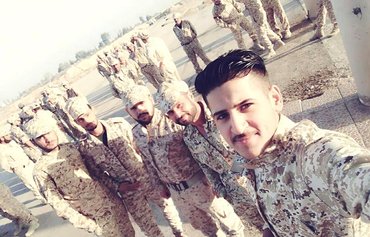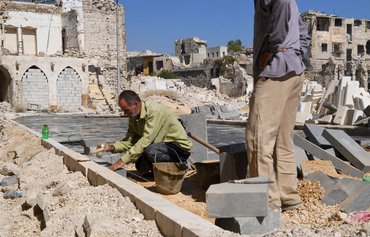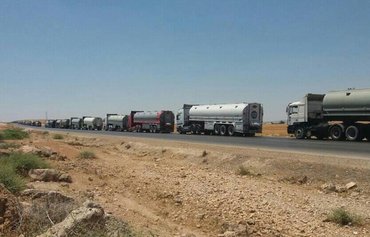BEIRUT -- A private investment company that some say is directly linked to Iran is poised to acquire a 49% investment stake in Damascus International Airport, raising security and economic concerns.
A newly established company, Iloma Investment Private JSC, will take over almost half the ownership of the airport with a capital investment in return for 20% of net revenues in the first decade and 25% in the second, Syrian opposition media outlets reported in July.
The Syrian Civil Aviation Authority will hold the remaining 51% stake.
Syrian economists and regime opponents claim that Iran controls the investment company, which they say is merely a front for dodging US sanctions.
![Iranian President Ebrahim Raisi waves during a welcome ceremony at Damascus International Airport on May 3. [AFP]](/cnmi_am/images/2023/08/10/43346-Damascus-airport-Raisi-600_384.jpg)
Iranian President Ebrahim Raisi waves during a welcome ceremony at Damascus International Airport on May 3. [AFP]
The company was registered in the names of Ali Mohammed Deeb, Ramia Hamdan Deeb and Razan Nizar Hamira, with each holding one-third ownership, according to Al-Rased media, which focuses on Syria's Sweida province.
Ramia Deeb was assigned one additional percentage point. It entitles her to manage the company, which reportedly aims to manage and invest in tourism facilities and airport services, the media outlet said.
The company also intends to enter into bids and auctions with the public sector, buy stocks and shares in all types of companies, and participate and contribute to their establishment or participate in their management and other matters, it said.
Independent Syrian media outlet Enab Baladi meanwhile revealed that Ali and Ramia Deeb are from Latakia province and are relatives of Syria's deputy minister of interior, Maj. Gen. Nasser Deeb.
The minister is one of the founders of the Russian-aligned Sanad Protection and Security Services private security company, which is protecting Russian investments in the oil, gas and phosphate industry in Syria, the outlet said.
Razan Hamira is a partner in the company Infinity and seven other companies with Ali Najeeb Ibrahim, reportedly an "economic front for Yassar Ibrahim", who is a close adviser to Syrian President Bashar al-Assad.
Control of critical infrastructure
Iran "is behind the investment in the private and public sectors in Syria, in service of its project", said Syrian dissident Mustafa al-Nuaimi, a researcher participating in the Arab Forum for Analysis of Iranian Policies.
The Iranian regime "deals with the al-Assad regime as if it is an Iranian subsidiary on Syrian territory", he said.
Iran deals with al-Assad as "an implementer of its wishes" and aims to control vital Syrian facilities amid the absence of a clear vision for a political solution in Syria, he said.
These facilities include Damascus International Airport, al-Nuaimi said, where the Islamic Revolutionary Guard Corps (IRGC) controls its own runway that it has converted into a military runway over which the Syrian regime has no control.
This is now being used "for the transport of and trade in weapons", he said.
Al-Nuaimi said the founders of Iloma Investment Private JSC are "a front for the Bashar al-Assad family".
Al-Assad's wife, Asma, serves as "a cover for the main investor, namely the Iranian project", he said.
The company is operating under disguised names that are not on US sanctions lists, he said, which enables them to operate for the benefit of the regime and the Iranian project and to supply them with dollars.
He pointed out that this enables them to develop investments in what is known as "the shadow economy".
The entry of Iran into the entire airport "culminates today with its seizure of the ports of Latakia and Tartous, in partnership with Russia, to smuggle Iran's weapons and engines for small and medium-range ballistic missiles", he said.
He attributed Iran's insistence on investing in the airport to "the blows dealt to the Iranian project in the Albu Kamal area, which is the main land artery for the Iranian militias in Syria".
Syria's worsening crises
Iloma is likely "in with an annual investment of no more than $125 million, while the needed investment is supposed to be much bigger", said Syrian dissident Samir Nashar.
"This confirms that the regime is in crisis."
The Syrian regime was expecting to receive economic support following the Saudi-Iran agreement, its return to the Arab League and normalization of relations with some countries, especially Saudi Arabia, Nashar said.
"Nothing happened, however, and Saudi Arabia did not open its embassy in Damascus in June as promised," he added.
Riyadh has put a hold on the restoration of its embassy in Damascus and has not appointed an ambassador to Syria, despite appointing new ambassadors to other countries worldwide, The Syrian Observer reported Tuesday (August 8).
Syria's multiple crises "are forcing the regime to abandon vital facilities in order to secure financial resources, especially as the economic crisis has reached an unbearable level", Nashar said.
The regime "is in a huge predicament, especially given the deterioration of the exchange rate of the Syrian pound, and it needs current funds to cover the salaries of employees and people affiliated with it", he said.
Corrupt sources of income no longer cover its needs, he added, "and this is forcing it to offer the remaining facilities up for investment".
"The sources of wealth in Syria have become nonexistent, because most of them are mortgaged to Iran and Russia," said Syrian economist Mohammed Abdul Salam Haj Bakri.
Allowing an investment company into Damascus International Airport "is only a way for the regime to pay off its debts and obtain liquidity to keep it in power", he said.
The regime's manipulation of company names is designed to evade the sanctions imposed on it, in service of itself, Russia and Iran, Bakri said.
Meanwhile, Russia and Iran "are escalating their conditions stipulating their investment in Syria's facilities, including the airport", he added.

![Iranian President Ebrahim Raisi greets officials after arriving at Damascus International Airport on May 3. [AFP]](/cnmi_am/images/2023/08/10/43345-Raisi-Damascus-visit-600_384.jpg)






